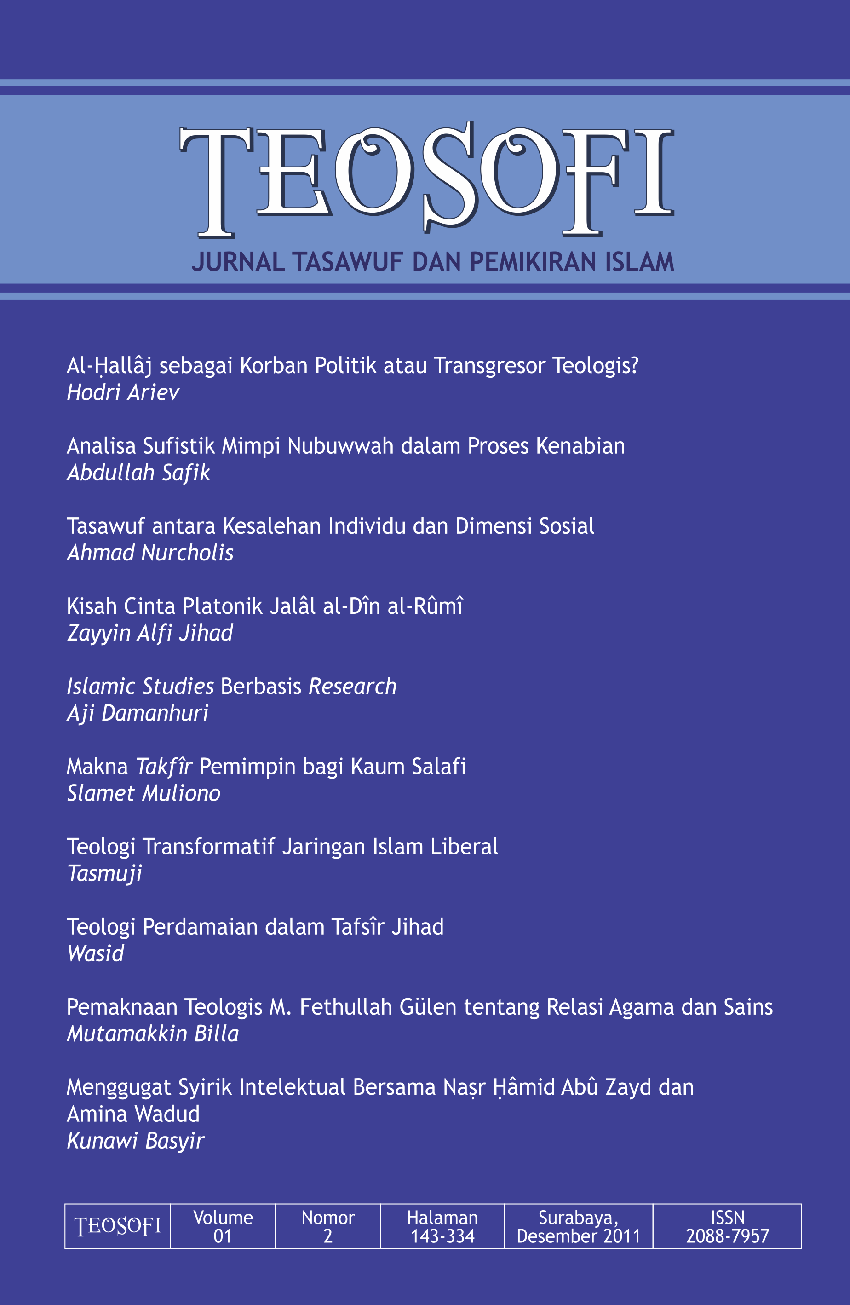Tasawuf antara Kesalehan Individu dan Dimensi Sosial
Main Article Content
Abstract
Within this modern era, where Islamic doctrines have been more eroded by the advance of scientific development, the power of umma has gradually decreased as a result of the abandonment of the spirit of jihâd al-nafs. There would be no other way except to revive Islamic Sufism's principles and values without leaving the rational way of thinking and escaping from social realities. When humans recognize their God, it would be easier for them to perform everything God commands them. Where did humans come from and where they will go to are among philosophical questions that the Sufi. These are foundations for the Sufis to “recognize their selves”, since by recognizing the self, God can be, then, recognized. Tasawuf is a way, which leads to qalb salîm (a pure heart). Many classic books discuss this, and the discussion deals with: firstly, efforts to straighten deeds, khushû‘, and courtesy of worship; secondly, ways of mujâhadah, self and heart purification, and abolishing madhmûmah (bad manners) and replacing them with mahmûdah (commendable conducts); thirdly, ma‘rifat, rabbânîyah, wahbîyah knowledge, dhawq, wijdânîyah, and nature of kashf.
Downloads
Article Details

This work is licensed under a Creative Commons Attribution-NonCommercial 4.0 International License.
Licensing
© The Author(s). Published by Department of Aqidah and Islamic Philosophy, Faculty of Ushuluddin and Philosophy, Sunan Ampel State Islamic University Surabaya, Indonesia.
This is an Open Access article distributed under the terms of Attribution-NonCommercial 4.0 International (CC BY-NC 4.0).
References
Alba, Cecep. dan Suhrowardi. Kuliah Tasawuf. Tasikmalaya: Fakultas Tarbiyah IAILM, 2007.
Anwar ZA. Miftahus Sudur dan Pengantar Ilmu Tasawuf. Artikel, 2007, tt.
Arifin. Filsafat Pendidikan Islam. Jakarta: Bumi Aksara, 1996.
Armstrong, Amatullah. Kunci Memasuki Dunia Tasawuf. Bandung: Mizan,1996.
Dadang. Pokok-pokok Ajaran Tasawuf. 2007. [Artikel tidak diterbitkan].
Darajad, Zakiyah. Membina Nilai-nilai Moral di Indonesia. Jakarta: Bulan Bintang, 1976.
Hamka. Tasawuf Modern. Jakarta: Pustaka Panjimas, 1987.
Hawash, Abdullah. Perkembangan Ilmu Tasawuf dan Tokoh-Tokohnya di Nusantara. Surabaya: Al-Ikhlas, 1980.
Iskandar. Rahasia Sufi. Yogyakarta: Pustaka Sufi, 2003.
Madjid, Nurcholish. Islam Doktrin dan Peradaban. Jakarta: Paramadina, 1995.
Nicholson, Reynold A. Mistik dalam Islam. Tim Penterjemah BA. Jakarta: PT. Bumi Aksara, 2000.
Russell, Bertrand. Sejarah Filsafat Barat: Kaitannya Dengan Kondisi Sosio-politik Zaman Kuno Hingga Sekarang, terj. Sigit Jatmiko dkk. Yogyakarta: Pustaka Pelajar, 2004.
Sjukur, Asjwadie. Ilmu Tasawwuf. Surabaya: PT Bina Ilmu, 1979.
Smith, Huston. Kebenaran yang Terlupakan Kiritik atas Sains dan Modernitas, terj. Inyiak Ridwan Muzir. Yogyakarta: IRCiSoD, 2001.
Theodorson. “Sirr al-Asrar”, dalam Syeikh Tosun Bayran al-Jerrahi al-Halreti, The Secret Of Secrets, terj. Joko S. Kahar. Penerbit Rizal Agusti.
Titus, Harold H. Persoalan-persoalan Filsafat, terj. Rasidi. Jakarta: Bulan Bintang, 1984.
Yunus, Mahmud. Kamus Arab-Indonesia. Jakarta: PT Mahmud Yunus Wadzuryah, 1990.

